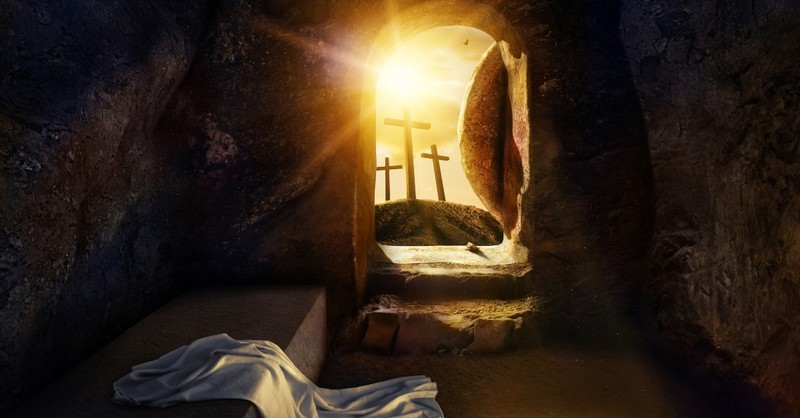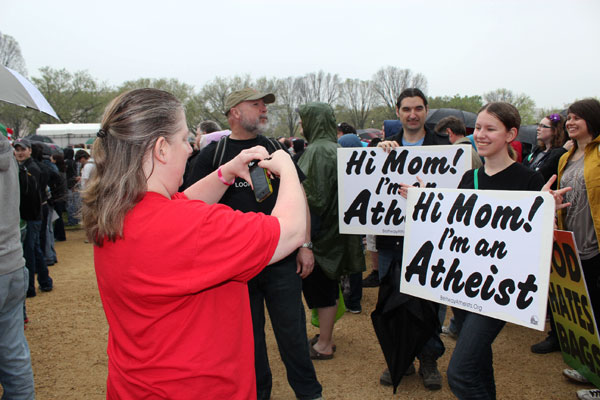(A revision of an earlier article.)
My Russian teacher at Wheaton College, Miss Naumoff, liked to relate an anecdote from the 1950s, when Nikita Khrushchev was the Soviet Union’s head guy. When Khrushchev was in New York, in the late 1950s, he was frequently interviewed by western reporters who insisted on repeatedly asking him if he believed in God. Finally becoming impatient, Comrade Nikita exclaimed, “I’m an atheist! I’m an atheist! God knows I’m an atheist!”
That absurd incident, contrasted with the celebration of the long life and ministry of Evangelist Billy Graham, reminded me of a story Pastor George Hancock-Stefan told about an atheism seminar held in the Soviet Union during the 1980s – seven decades into communism’s flagship effort to make Marx and Lenin’s vision of dialectical materialism an irreversible reality. (It was Marx who had called religion “the opiate of the masses.”) Long a primary communist doctrine, atheism had been thoroughly hammered into the minds of the Soviet people. God was effectively erased from the USSR – or so the leftist pooh-bahs of western faculty lounges thought.
On the occasion which Pastor George mentioned, some 10,000 people had listened to hours of lecture on the joys and benefits of atheism. Finally, when the emcee called for questions or comments, a nondescript old man shuffled forward to the podium and asked to speak. Seizing the microphone, he proclaimed in a strong voice: “Christos voskres! (Christ has arisen!)”1
After an electric moment of silence, 10,000 people rose and roared back the ancient Russian response: “Voistynu voskres! (He is risen, indeed!)”
Thus (recalling Pastor George’s words), did sixty-plus years of one of history’s most committed attempts to eradicate God from a people’s collective mind and spirit come to naught. All the labors of atheism vanished like a puff of smoke on a windy day. God still dwelled in the hearts of the Russian people, and all the ruthless power of the Marxist-Leninist Soviet state had failed to dislodge Him. It was a day to recall the words of Isaiah:
“…the mountains and the hills shall break forth before you into singing, and all the trees of the field shall clap their hands.2

That story draws me strongly. My mind and spirit resonate with it, and I am filled with emotion. I thought of it again, this week, with Easter falling on March 31st in the Catholic Church and most Protestant denominations.3
As it happens, the USA has also been contending, over the past six decades, with a determined blitzkrieg to scrub God from the nation’s public discourse. That militant secularism campaign – instigated and led by leftist intellectuals, agnostics, atheists, educators, publishers, and a growing claque of the entertainment media – has now been effectively joined by the judicial arms of both state and federal governments. The years-long response to the invasive COVID virus also included determined governmental efforts to keep churches closed in some locales.
Various court rulings since the 1940s have eroded First Amendment protections of religion. Bible-reading and non-sectarian prayer in schools – a daily staple in public school classrooms of the 1940s and ’50s, when I was a student – have been declared “unconstitutional.” Witnesses no longer place a hand on the Bible and swear to tell the truth (and nothing but the truth) in court. Wearing of religious symbols is banned in some schools, and some students have been academically penalized for writing reports on Christian topics. Christianity has even been denounced as “racist” because too many of its followers are white.
This focused campaign, reinforced by growing governmental hostility to Christian expressions, has brought public education to the point where God and the Christian Faith cannot be treated as serious subjects of study or even mentioned. Today, nearly every other religion – including radical Islam, Wicca and even snake-handling – has currency and can be discussed freely in public schools and many universities. But the names of God and Jesus Christ may not be uttered in schools or in the halls of government, except as profanity.
In recent years, the Hollywood film industry has mostly ignored religious themes – or else has parodied faith and Biblical subjects with sacrilegious slanders, such as Scorsesi’s Last Temptation of Christ. The television series Touched by an Angel, produced by Martha Williamson, has treated God and faith with respect and reverence. But even that series dare not invoke the person or name of Jesus Christ – so strong is anti-Christian bias in the entertainment industry.
So the stage was set. Just when it looked like anti-God forces were triumphantly sweeping the field, another little old man tottered up to the podium. That “little old man” was the manly, controversial, supremely confident action-films actor (and now big-time director), Mel Gibson. His Christos voskres! declaration was hiswildly successful 2004 film, The Passion of the Christ, into which he poured $25 million of his own money.
Like the communist apparatchiks at the Soviet atheism seminar, Hollywood and New York film moguls were shocked and outraged that Mr. Gibson had cinematically resurrected a subject they thought was safely dead (and buried) for good. The Passion was unquestionably an “in your face” display of cinematic chutzpah. But it was much more than that. In one TV-interview, Mr. Gibson mentioned that in the crucifixion scene he expressly wanted his hands to drive the nails into the Savior’s hands and feet, thereby illustrating that his sin had also caused the death of God’s Son. How many public figures would consider saying such a thing?
In the Protestant circles that I frequent, Mr. Gibson’s tour de force was the subject of much attention – almost to the point of religious devotion. People spoke of the film causing a “religious re-awakening” in the USA and perhaps the entire world. They were thankful that something had finally turned things around, religion-wise, in our country.
I think a little differently about this. Although I have great respect for Mr. Gibson’s social and financial courage – as well as his personal faith – in daring to make a Christian-themed film which his industry opposed, I don’t believe that the graphic, hard-hitting film truly created a return to faith. God was already in the hearts of people, and that affirmation was waiting to burst out when someone finally stood up and proclaimed Christos voskres! Mr. Gibson’s film simply emboldened the great shout of “Voistynu voskres!” which rang out, world-wide.

God and Jesus Christ, it turns out, were not dead after all. And militant secularism was not triumphant. Just as God still lived in the hearts of the Russian people after all those years of soul-deadening propaganda, so He still lives in the hearts of Americans – indeed, in the hearts of people the world over. We needed only to hear “Christ is arisen” – brashly proclaimed through a film produced by a man no one would call a “religious leader” – to be inspired to roar back: “He is risen indeed.” God does indeed “use the foolish things of this world to confound the wise.”4
Today we have hit another low point in our cultural attitudes toward God and faith. Leaders of one of our major political parties have come out as militant champions of abortion on demand, up to the very moment of live birth, as well as infanticide after a live birth. Denial of biological human sexuality – celebrated by media and the entertainment industry as a fun and harmless curiosity needing serious legal protection – has also thrown the nation into turmoil. Many believers are discouraged by this noisy counter-attack on faith by political leaders who are now clearly at war with Biblical morality. Millions of Christians wonder if the war has been lost.
But new champions of the faith keep arising out of unlikely places. Blue Bloods, a TV crime and cop series – now in its 14th season – celebrates lives of faith lived out in rough and tumble fashion, on the job, by a four-generation family consisting of New York police officials, cops on the beat, and a crime-prosecutor. Expressions of faith rarely seen on TV today, along with affirmations of the sacred importance of family, are clearly represented, without apology. Profanity is not part of the characters’ dialog. None of the characters is perfect, but faith is clearly at the center of their lives. Every episode includes a scene of the family’s lively Sunday dinners, and even the actors have expressed how valuable those scenes are to them, personally.
Other surprising examples keep arising to show that the war is not lost. Christ is risen. He is alive! But more than that, He lives in the hearts of far more people than we might have thought. They, striving in the power of the Risen Christ, will defeat today’s Satanic “culture of death.” As the Psalmist wrote:
“Shout for joy to the LORD, all the earth, burst into jubilant song with music; make music to the LORD with the harp… and the sound of singing, with trumpets and the blast of the ram’s horn – shout for joy before the LORD, the King!
“Let the sea resound, and everything in it, the world, and all who live in it. Let the rivers clap their hands, let the mountains sing together for joy; let them sing before the LORD, for he comes to judge the earth. He will judge the world in righteousness and the peoples with equity.”5
Happy Easter, America. Christos voskres! Voistynu voskres!
*********
- Traditional Russian Orthodox Easter greeting:
Христос воскрес(е)! (Christos voskres) Christ has arisen!
воистину воскрес(е)! (Voistynu voskres) Truly arisen! (i.e., He is risen, indeed.)
2. Isaiah 55:12 (KJV).
3. Eastern and Russian Orthodox Easter follows a different ecclesiastical calendar.
4. I Corinthians 1:27
5. Psalm 98:4-9



4 comments
I didn’t know anything about the show Blue Bloods, but the description reminded me of a PBS special on the filming of Downton Abbey. The special was made in the UK about the blockbuster series which aired on PBS in the USA. During that special, they interviewed the actors and actresses who described how important their character’s prayers at family meals were for the show. I thought, “what are they talking about?” I watched every Downton Abbey and never saw a prayer. Then it occurred to me, the atheists at PBS had censored them all out of the entire series. Not that anyone needs reminding, but Satan’s minions are everywhere.
Woody, I loved your article! And particularly the comments about Mel Gibson’s The Passion.
Wonderful article. Very encouraging! I knew Alice Naumoff at Wheaton though I didn’t take her language classes. A most remarkable person! David Lyle Jeffrey mentions taking her German and Russian classes at Wheaton and talks about her teaching style.
https://christianscholars.com/language-learning-as-spiritual-medicine-for-a-culture-of-narcissism/
Thank WZ for reminding us that there is nothing new under the Sun. Reaching a certain age also helps you understand the Psalms and Proverb’s worldly admonitions of how faith, life, and living in a fractured world are intertwined and can never be cut, lest the human species die. When the bumbling buffoon in the White House declares Easter Day for celebrating not for the Risen Savior of the world, but for celebrating a tiny fraction of one percent of the population who are desperately trying to find a right mind, relevance, and love in a fallen world, then you understand that God has hardwired the human heart and there is no human power on earth that can rewire the compelling and every present pull of the Creator. Even Tik Tok.